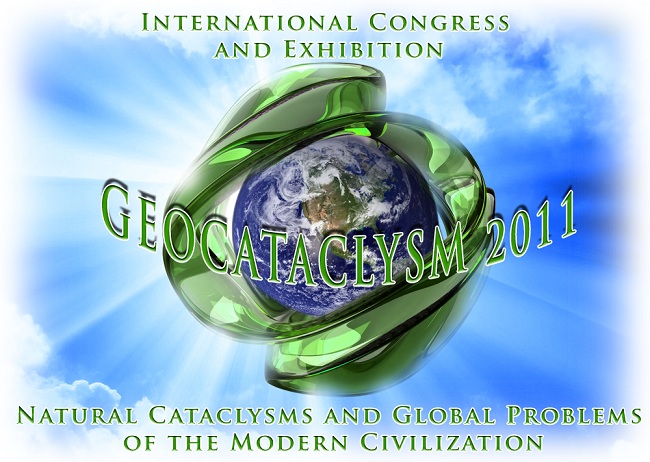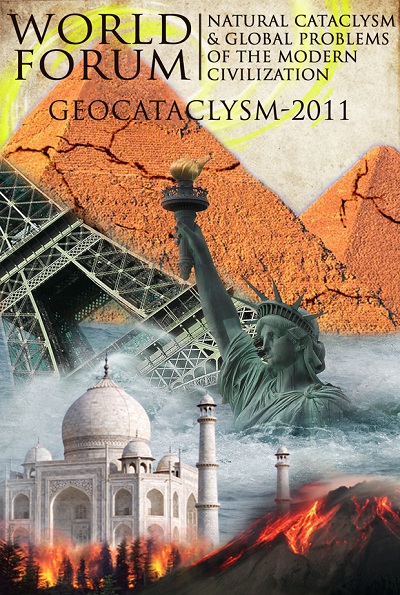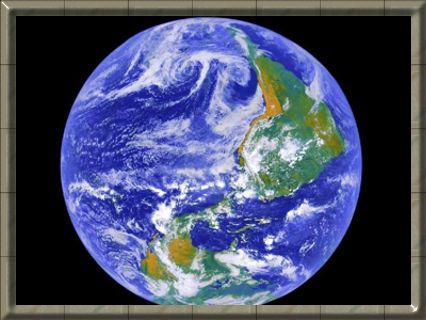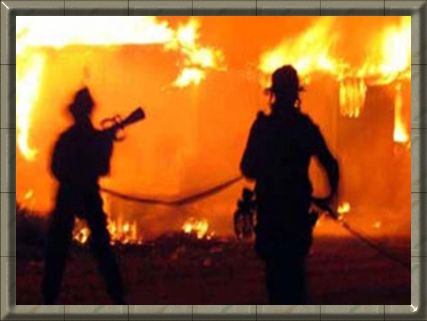Call for Papers
INTERNATIONAL CONGRESS AND EXHIBITION
“NATURAL CATACLYSMS AND GLOBAL PROBLEMS OF THE MODERN CIVILIZATION”
GEOCATACLYSM - 2011
Background
During the last few years, scientists around the world have been witnessing alarming changes in the environment; these changes are of global significance for the entire planet. Global changes can now be observed throughout all of the Earth, including its core, mantle, lithosphere, hydrosphere, atmosphere, ionosphere, and magnetosphere. According one of the world’s largest insurance companies Swiss Re (Switzerland), economic damage from natural disasters in 2010 alone totaled $ 222 billion, which is three times the economic losses for the year 2009 ($ 63 billion). According to the report by the UN Economic Commission of for Latin America and the Caribbean (ECLAC/CEPAL), 2010 natural disasters have killed 300,000 people in Latin American countries, with material damage amounting to 49.4 billion dollars.
 It has to be acknowledged that humankind is not prepared to enter the global natural cataclysms era, either technologically, economically, legally, or psychologically. A joint effort by scientists, international organizations and governments of different states under the aegis of the UN is needed in order to take effective measures to counter natural disasters and to minimize the casualties and damage they cause to humanity.
It has to be acknowledged that humankind is not prepared to enter the global natural cataclysms era, either technologically, economically, legally, or psychologically. A joint effort by scientists, international organizations and governments of different states under the aegis of the UN is needed in order to take effective measures to counter natural disasters and to minimize the casualties and damage they cause to humanity.
The International Congress will bring together representatives of all interested countries and organizations to convene an emergency forum and collectively discuss the most topical problems with the purpose to reduce casualties and damage caused by natural disasters. The ultimate goal of the Congress is to discuss and approve the “INTERNATIONAL EMERGENCY PROGRAM TO REDUCE RISKS AND NEGATIVE CONSEQUENCES OF NATURAL CATACLYSMS” developed jointly by the International Committee GEOCHANGE, WOSCO, GNFE and a group of international experts aimed to prepare a set of international laws on cooperation of the world community in disaster-stricken areas, prediction of natural disasters, earthquake engineering and other important issues. Following a Congress resolution, the program will be presented to the UN Secretary-General and sent to all countries’ leaders and legislative bodies for consideration and appropriate action. There are some special sections of the Congress: the General Assembly of the International Committee GEOCHANGE on Global Environmental Change and the International Conference “Forecasting Earthquakes-2011”. We can already state that the Congress is going to be attended by representatives of more than 100 countries, with prominent scientists, members of parliaments and governments of various countries, famous social activists and policymakers among them.
Organizing Committee of Congress:
Address: Fetih Mahallesi, Tarhali Caddesi, Tarhali Sokak, Tarhali sitesi No.7, Kavakyeli Plaza, B Blok, Daire 1, Atasehir, Istanbul, Turkey.
Phone: + 90 536 431 07 56
Fax: + 90 216 386 05 33
E-mail: This e-mail address is being protected from spambots. You need JavaScript enabled to view it
Board of Congress
Chairman:
Prof. Dr. Elchin Khalilov
Chairman of International Committee on issues of Global
Changes of the Geological Environment GEOCHANGE (IC GCGE),
President of GNFE (UK, London)
Co-Chairman:
Prof. Dr. Franz Halberg
Honorary Director of the Halberg Chronobiological Center (USA, Minneapolis)
Coordinator and Executive Secretary of the Board:
Dr. Sevinc Yatman (Turkey, Istanbul)
Coordinator:
Mr. Fuad Damirov (Azerbaijan, Baku)
Board members:
Prof. Dr. Franz Halberg (USA, Minneapolis); Prof. Dr. Cengiz Toklu (Turkey, Istanbul); Prof. Dr. Vitaly Starostenko (Ukraine, Kiev); Prof. Dr. Alain Herbosch (Belgium, Brussels); Prof. Dr. James Joyce (Puerto Rico, Mayaguez); Prof. Rosca Marcel (Romania, Oradea); Dr. Salih Karakisa (Turkey, Ankara); Dr. Cavit Yatman (Turkey, Istanbul); Prof. Dr. Rza Makhmudov (Baku, Azerbaijan); Prof. Dr. Nikolay Koronovsky (Russia, Moscow); Prof. Dr. Karl Hecht (Berlin, Germany); Dr. Tamara Tsutsunava (Georgia, Tbilisi); Dr. Juan Caviria (Venezuela, Merida); Dr. Manoel Baretto Da Rocha Neto (Brasilia, Brazil); Prof. Dr. Giuliano Panza (Italy, Trieste); Prof. Dr. Mukherjee Saumitra (India, New Dehli); Prof. Dr. Castro Antonio (Spain, Huelva); Prof. Dr. Hong Yetang (China, Guiyang); Prof. Dr. Santourdjian Ohanes (Bulgaria, Sofia); Dr. Allen Simpson (UK, London); Dr. Bor-ming Jahn (Taiwan, Taipei); Ph. D. Jae Con Kim (Korea, Daejeon); Prof. R Thomas Palo (Sweden, Sundvall); Prof. Dr. Henrik Georg Bohr (Denmark, Lyng); Prof. Gerardus 't Hooft (Netherlands, Utrecht); Prof. Ph.D. Attari Mokhtar (Algeria, Algiers); Prof. Dr. Gediminas Motuza (Lithuania, Vilnius); Dr. Fabio Francisco Segura (Nicaragua, Managua); Dr. Karczewski Jean Francois (France, La Ferte-Saint-Aubin); Dr. Bilberto Zavala (Peru, Lima); Ph.D. Slobodan Miko (Croatia, Zagreb); Dr.Vladan Kovacevic (Serbia, Belgrade); Dr. Francisco Velandia (Colombia).
Sections of congress
SECTION 1
Earth Sciences:
 |
|
SECTION 2
Economy and finances:
 |
|
SECTION 3
Transport:
 |
|
SECTION 4
Health care:
 |
|
SECTION 5
Emergency management:
 |
|
SECTION 6
Construction:
 |
|
SECTION 7
Ecology and Environment:
 |
|
SECTION 8
Communication systems and information technologies:
 |
|
SECTION 9
International and national law:
 |
|
SPECIAL SECTIONS
- GENERAL ASSEMBLY OF INTERNATIONAL COMMITTEE ON ISSUES OF GLOBAL CHANGES OF THE GEOLOGICAL ENVIRONMENT GEOCHANGE;
- INTERNATIONAL CONFERENCE AND EXHIBITION “EARTHQUAKE FORECASTING – 2011 (EFC-2011)”;
- TRAINING SEMINAR OF THE GLOBAL NETWORK FOR THE FORECASTING OF EARTHQUAKES








